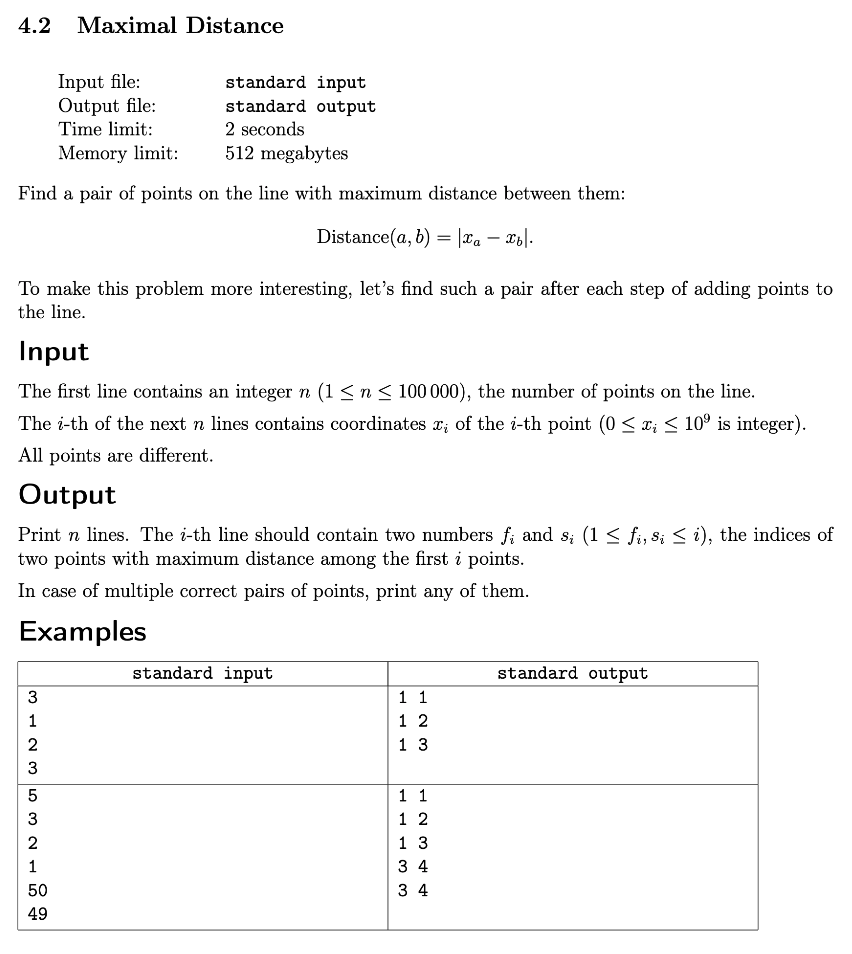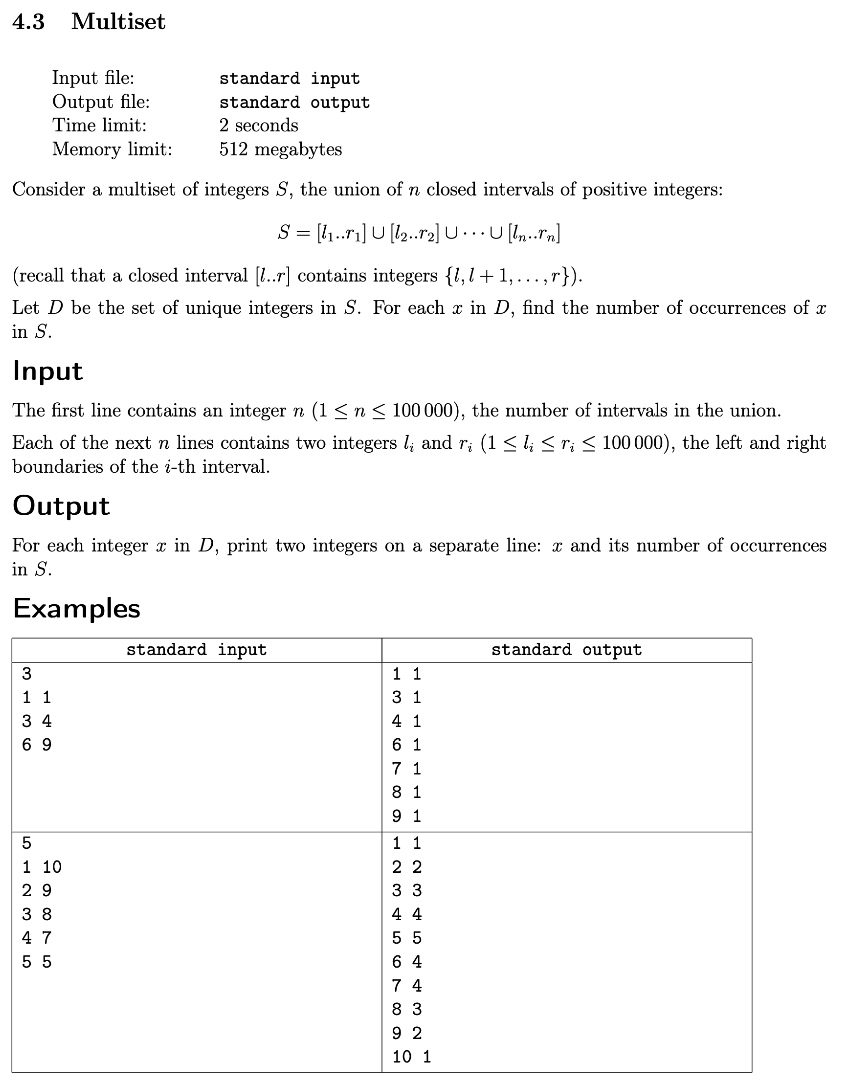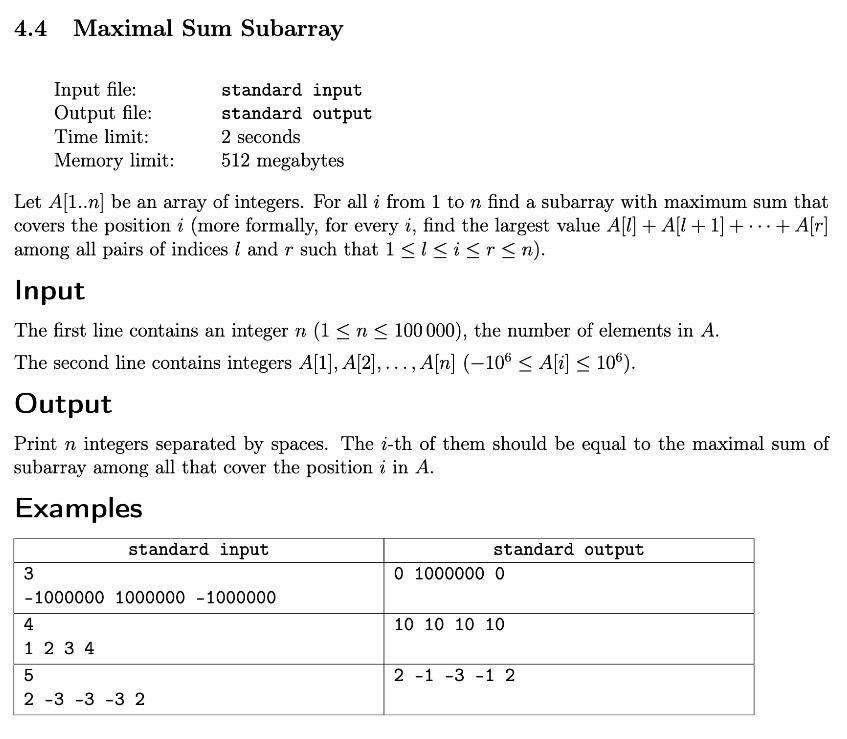competitive-programming
Competitive Programmer's Core Skills by Saint Petersburg State University
Project maintained by claytonjwong Hosted on GitHub Pages — Theme by mattgraham
Week 4: Technical Problems
Key Concepts
- Invent basic greedy solutions and prove their correctness
- Understand what programming language features are most important on competitions
- Know specialties of popular programming languages
- Apply the segment tree data structure to solve problems which require answer queries of certain form
Resources
Assignments
The Most Frequent Symbol

#include <iostream>
#include <vector>
#include <unordered_map>
using namespace std;
using PrefixCount = vector<unordered_map<char, int>>;
int main() {
string S; cin >> S;
int N = S.size();
PrefixCount A(N + 1);
for (auto i{ 1 }; i <= N; ++i) // i is offset by 1 for recurrence relation...
A[i] = A[i - 1], ++A[i][S[i - 1]]; // A[i] = A[i - 1] with count of current char at S[i - 1] incremented by 1
auto getMaxFreq = [&](auto i, auto j) {
auto max{ 0 };
auto ans{ 'a' };
for (auto& pair: A[j]) {
auto c = pair.first;
auto cnt = A[j][c] - A[i - 1][c]; // use prefix count for O(1) lookup per range i..j
if (max < cnt)
max = cnt,
ans = c;
}
return ans;
};
int K; cin >> K;
while (K--) {
int L, R; cin >> L >> R;
cout << getMaxFreq(L, R) << endl;
}
return 0;
}
Maximal Distance

#include <iostream>
using namespace std;
int main() {
struct MinMax {
int INF = 1e9 + 7,
min{ INF },
max{ -INF };
} value, index;
int N; cin >> N;
for (auto i{ 1 }; i <= N; ++i) {
int x; cin >> x;
if (value.min > x) value.min = x, index.min = i;
if (value.max < x) value.max = x, index.max = i;
cout << min(index.min, index.max)
<< " "
<< max(index.min, index.max)
<< endl;
}
return 0;
}
Multiset

#include <iostream>
#include <sstream>
#include <vector>
#include <limits>
#include <algorithm>
using namespace std;
using VI = vector<int>;
int main() {
auto min = numeric_limits<int>::max(),
max = numeric_limits<int>::min();
int N = 100 * 1000;
VI A(N + 1);
int K; cin >> K;
for (int i, j; K-- && cin >> i >> j;)
min = std::min(min, i), ++A[i],
max = std::max(max, j), --A[j + 1]; // j + 1 because we want i..j inclusive to be counted, then "post-decrement" at j + 1
for (auto i{ 1 }; i <= N; A[i] += A[i - 1], ++i); // add relative count offsets (ie. overlaps in the sequences)
stringstream ss;
for (auto i{ min }; i <= max; ++i)
if (A[i]) ss << i << ' ' << A[i] << endl;
cout << ss.str() << endl;
return 0;
}
Maximal Sum Subarray

#include <iostream>
#include <vector>
#include <algorithm>
#include <iterator>
#include <cassert>
using namespace std;
using LL = long long;
using VLL = vector<LL>;
int main() {
int N; cin >> N;
VLL A, ans;
copy_n(istream_iterator<LL>(cin), N, back_inserter(A));
VLL L(N + 1), R(N + 1);
auto prefixSums = [&]() {
for (auto i{ 1 } ; i <= N; ++i) L[i] = L[i - 1] + A[i - 1];
for (auto i{ N - 1 }; i >= 0; --i) R[i] = R[i + 1] + A[i];
};
auto prefixMins = [&]() {
for (auto i{ 1 } ; i <= N; ++i) L[i] = min(L[i], L[i - 1]);
for (auto i{ N - 1 }; i >= 0; --i) R[i] = min(R[i], R[i + 1]);
};
prefixSums();
assert(L[N] == R[0]); // total sum exists at the end of each prefix sum
auto sum = L[N] = R[0];
prefixMins();
for (auto i{ 0 }; i < N; ++i)
ans.push_back(sum - L[i] - R[i + 1]);
copy(ans.begin(), ans.end(), ostream_iterator<LL>(cout, " ")), cout << endl;
return 0;
}